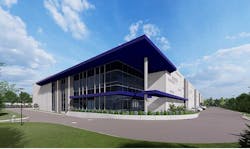Former AOL Headquarters in Ashburn Will Become a Data Center Campus
The former America Online campus in Ashburn will be converted into a large data center campus by a joint venture between developer American Real Estate Partners (AREP) and investor Harrison Street, which jointly acquired the property last month. The new owners plan to invest $1 billion to create new data centers across multiple sites in Loudoun County.
The AOL headquarters on Pacific Boulevard in Ashburn was a launchpad for the Internet revolution that swept the country in the early 1990s. AOL served as the initial on-ramp to the Internet for many Americans with its ubiquitous installation CDs and “You’ve Got Mail!” notification earbug. The company has since gone through numerous corporate combinations, including tie-ups with Time-Warner, Verizon and Yahoo.
The AREP/Harrison Street JV bought the campus last month and plans to redevelop it to create a 300-megawatt data center campus featuring four powered shells that can be customized for hyperscale tenants. The developers said their current plan is to demolish the existing AOL/Yahoo buildings and construct new powered shells with flexible designs that will range in size from 265,000 to 440,000 square feet.
The AOL campus conversion is part of a larger plan by AREP and Harrison Street to invest $1 billion to develop six powered shell data centers representing 2.1 million square feet of data center space in Data Center Alley. The partnership is already developing a data center project on Beaumeade Circle in Ashburn, and has acquired property in Arcola in the Dulles Cloud Corridor where it plans to build a two-building campus.
More Capacity for Data Center Alley
“As demand for data centers continues to far outstrip current capacity, AREP is focused on developing assets that expand data availability and connectivity,” said Doug Fleit, AREP’s Chief Executive Officer. “Since partnering with Harrison Street in January 2021, we have executed on our commitment to acquire powered shell assets at scale for large cloud providers and colocation users in the Northern Virginia market that can be configured to best suit tenants’ power density and service needs.”
“Digital real estate is a core pillar of Harrison Street’s demographically driven investment strategy, and we are thrilled to significantly expand our presence in the world’s most active data center market,” said Michael Hochanadel, Managing Director and Head of Digital Real Estate at Harrison Street. “We look forward to working closely with AREP as we seek to identify strong data center investment opportunities in the region going forward.”
The expansion by AREP and Harrison Street is part of the data center boom sweeping Loudoun County, which has grown into the global capital for cloud computing. The focal point for data center development is Ashburn, home to the Internet intersection known as “Data Center Alley.” The growth of AOL, along with a key interconnection campus built by Equinix, planted the seeds for this growth.
The AOL campus is now surrounded by data center developments, including its own early e-mail facility across the street (which is now operated by STACK Infrastructure) as well as growing campuses for Digital Realty, QTS Data Centers, Vantage Data Centers and Sentinel Data Centers.
The redevelopment of the AOL campus reflects the new reality in Northern Virginia real estate: In some neighborhoods, the highest value for any piece of land will be for data centers. That’s reflected in the AOL transaction, with local media reporting a sale price of $136 million for the 43-acre site, or about $3.14 million per acre. That’s a big jump from the $2.09 million an acre the AREP/Harrison Street JV paid last year for its site at 21445 Beaumeade Circle.
With open land dwindling, that often means developers must buy commercial properties and knock down the existing buildings to make way for purpose-built data centers.
AREP, Harrison Street See Growth Opportunity
AREP was founded in 2003 and has acquired more than 17 million square feet of real estate totaling more than $4 billion in value. The company focuses on development in the Mid-Atlantic region, with a concentration of properties around Washington, D.C.
AREP has teamed with Harrison Street, which focuses on real estate in sectors like senior living, student housing and life sciences, but has recently stepped up its investments in the data center sector. In recent months, Harrison Street has teamed with 1547 Data Center Real Estate to acquire carrier hotel buildings in Milwaukee and Portland, Oregon.
Doug Fleit, the CEO of American Real Estate Partners. (Image: AREP)
Last year the two companies formed a joint venture to acquire the Beaumeade Circle property, a former office building in close proximity to the original Equinix Ashburn campus, which is the center of connectivity in America’s most wired neighborhood. AREP and Harrison Street have begun redeveloping the site as ABX-1, a 265,000 square foot two-story powered shell.
The JV has also acquired land in Arcola, directly across the street from Google’s new data center near Dulles International Airport. The Arcola development will include two modern powered shell build-to-suit data centers with approximately 100-125 MW of capacity.
Harrison Street says it has also acquired a “significant minority interest” in Summit Infrastructure Group, a leading connectivity player in Northern Virginia, where it operates more than 600 miles of underground, newly constructed dark fiber infrastructure.
American Real Estate Partners has developed office and mixed-use properties around Washington, D.C., but sees data centers as a long-term opportunity and has built building an in-house team with data center expertise.
“The demand for more data centers is simply based upon our society’s move to an even more integral life with technology,” said Fleit. “Every aspect of our lives is changing whether it is more connectivity with 5G and more robust streaming entertainment and communications, the inclusion of new augmented reality applications like Meta, self-driving cars and an endless evolution of new technologies and applications. We are creating not just exponentially more data but new and ever more useful ways to apply that data. All of this speaks to a long term data center trend for markets like Ashburn, Virginia.”
About the Author



